Error message
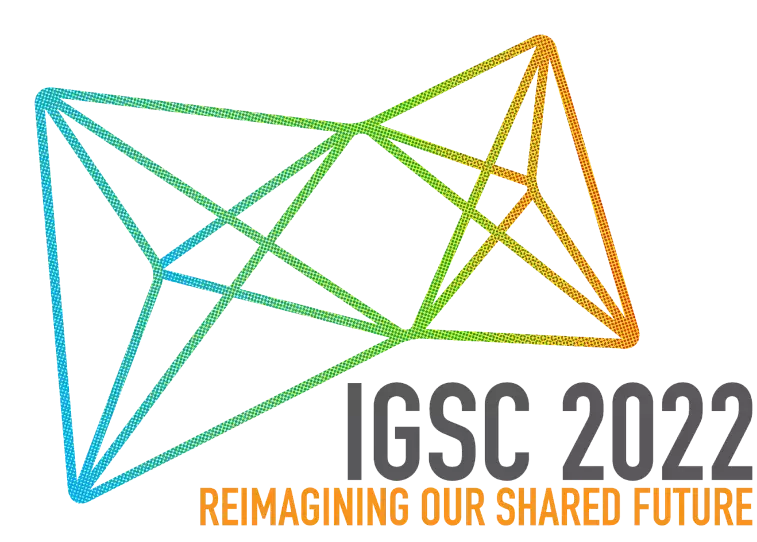
The 21st East-West Center International Graduate Student Conference
Virtual Conference Dates: February 17-20, 2022
The IGSC will be hosted online, utilizing the conference platform Whova, which incorporates real-time program sessions, poster sessions, Zoom group meetings, and various virtual activities for dynamic interactions among participants.
Click here to download this year's program:
“Laʻi ka moku o ka nohona. There is peace in the land of our existence.” ~ traditional Hawaiian proverb Erratic severe weather, global warming, and environmental change is the universal context within which all future events throughout the globe will unfold into society. The strongest solutions for a sustainable future will be informed by the wisdom of the past. In the Pacific-Asia Region, the greatest resilience comes from expert knowledge held sacred within the practice of placemaking. As such, there is value to centering indigenous worldviews to amplify resilience and positive peace in the context of the ongoing climate crisis. By coupling positive peacebuilding problem-solving methods with rigorous climate change research and resilience strategies, we equip decision makers with the tools needed to respond to the climate crisis, reduce social friction, and build social cohesion through locally-based and culturally-appropriate responses. Impact, opportunity recognition, and development of programs designed to scale community-based solutions already in existence is among the most just ways to meet local and global goals. This will be the key to unlocking innovation and ensuring durability and resilience of solutions to the climate emergency and the survival of our homelands. This work honors indigenous practices, intergenerational knowledge, and traditional stories by elevating an ancient sanctuary of peace called pu‘uhonua. In Pacific tradition, pu‘uhonua were physical places that people could go to escape violence, abuse, or death after some type of crisis occurred. By applying indigenous feminism, a contemporary analysis and allegorical application of these refuges create lessons for a climate-resilient future despite rising sea levels and economic extraction across the islands. The purpose of this work is to engage leaders of all disciplines with a lens oriented toward solutions to implement resilient strategies into their communities, activate discourse, and strive towards a world of justice using climate as the overarching context. Consistent with that theory of change and supporting science, this work seeks to build transformational change that center ourselves as the post-colonial pu‘uhonua. Speaker: Kealoha Fox, PhD, Senior Advisor, Institute for Climate and Peace Storytelling lets us revisit indigenous knowledge, traditions, values and beliefs that have been handed down from generations to generations. The closing event brings together three Pacific storytellers who each in their own storytelling medium not only connect Pacific people through the power of their stories but also bring awareness to the issues affecting the Pacific communities and future generations. This year is the 21st year of the International Graduate Student Conference (IGSC) taking place February 17-20th, 2022. The East-West Center (EWC) is inviting graduate students and young professionals from around the world to submit abstracts relating to the Asia Pacific region. The conference will provide an opportunity to share interdisciplinary or transdisciplinary perspectives formally, through presenting and attending panel presentations, and informally, through networking with scholars and community members across disciplines in the warm and collaborative environment of the EWC. A long-standing goal of the EWC has been to promote collaborative and mutually-beneficial partnerships between communities and scholars. Much of our research is rooted in the collective knowledge, insight, and years of effort contributed by communities, organizations, and experts across the Asia-Pacific region. Even so, academic findings can often end up limited to scholars and experts, which leads to a greater knowledge gap between researchers and working professionals. Therefore, innovative types of communication and partnership are needed to promote research understanding and community interaction. This year the conference theme is "Reimagining our Shared Future." With emergent challenges at the planetary level, ranging from environmental issues, rising inequalities, poverty, ideological polarization, to a global pandemic, it is essential to reimagine a more just and sustainable future for all on our shared planet Earth. These issues prompt renewed attention to the entire ecosystem—living beings and nonliving things—that form the basis of life on Earth. This includes but is not limited to humans, animals, plants, inanimate objects, elements, energy, systems and structures. Besides producing new knowledge and innovative solutions, emerging scholars’ responsibilities may also include revisiting ancient or indigenous knowledge concerning the human or non-human world that crosses a multiplicity of disciplines to address the contemporary issues on Earth. Thus, IGSC 2022 invites contributions across a wide range of disciplines that (1) aim to contribute to the sharing and advancement of the multiple knowledges, epistemologies, and ontologies of the Asia-Pacific region, and (2) reimagine theory, practice, and policy for a more just and sustainable shared future. We also invite artistic expressions that utilize alternative methods for reimagining the world we live in. We especially welcome (but are not limited to) interdisciplinary and transdisciplinary contributions, and research that applies non-Western, decolonial, post-colonial, and indigenous lenses. For any inquiries or questions regarding the conference, please connect with us at [email protected]. The IGSC Frequently Asked Questions pages contain comprehensive information regarding the conference, including abstract submission, registration and fees, and guidelines for presenters. This year's conference will be hosted fully online (click here to be taken to the conference site). Presenters: please see our guidelines page for more information. Attendee registration is available at our conference website. Normally, the conference is held at the Hawaii Imin International Conference Center, at 1777 East-West Road, Honolulu, HI 96848, which adjoins the University of Hawai‘i at Mānoa campus and the East-West Center residence halls. Refer to the Imin Conference Center website for more information. A limited number of rooms at the East-West Center residence halls are reserved for registered conference participants. Special rates will be made available for conference participants but will be applicable only for the conference dates. (However, once you check out, the special rates will not be applicable if you check in again during the specified period). Make sure that you mention the International Graduate Student Conference when you reserve a room. The rates per night for the conference participants are as follows: Hale Manoa & Hale Kuahine Lincoln Hall Rent is due upon check in. The single and double rooms (in Hale Manoa and Hale Kuahine) are dormitory style with shared bathroom/toilet facilities while the studio (in Lincoln Hall) has its own bathroom/toilet facility. Sheets/blankets/pillows are provided in the dormitories, and all of those plus towels are also provided in Lincoln Hall. None of them has air conditioning. Shared kitchen facilities and coin-operated laundry machines are available in Hale Manoa and Hale Kuahine. Please refer to the EWC Housing website for details (including pictures of the rooms) and reservation procedure. Participants are requested to get in touch with EWC Housing authorities directly for their accommodation reservation as well as questions thereto by email at: [email protected]. Please wait until you are notified about the results of abstract selection committee before making a reservation. Due to the busy holiday season, please allow up to a week for the EWC Housing Office to respond to inquires. We look forward to welcoming you to the East-West Center. In preparation of your arrival, please visit our East-West Center Participant Information webpage where you can find useful tips for your stay here. Non-US participants who need a B-1 visa to enter the United States are encouraged to start looking for information related to obtaining a US visa in your country. The following websites may be useful for you: US Embassies Visa Appointments & Waiting Times Visa Waiver Program Please note that the EWC does not provide visa assistance. However, the abstract acceptance email for the conference serves as a valid document for you to initiate your visa process. For additional information, as well as photos, please refer to the web pages for past conferences, available in the right-hand menu. Also see the video below: Contact Information The International Graduate Student Conference The East-West Center is committed to following travel guidelines set out by the CDC regarding the coronavirus. The 2022 conference activities will be hosted fully online this year, utilizing the conference platform Whova. Information for logging into Whova will be provided at a later date. We are excited to plan an integrated conference and networking experience from the comfort of our own homes. The IGSC will be hosted online, utilizing the conference platform Whova, which incorporates real-time program sessions, poster sessions, Zoom group meetings, and various virtual activities for dynamic interactions among participants. Click here to download this year's program:
“Laʻi ka moku o ka nohona. There is peace in the land of our existence.” ~ traditional Hawaiian proverb Erratic severe weather, global warming, and environmental change is the universal context within which all future events throughout the globe will unfold into society. The strongest solutions for a sustainable future will be informed by the wisdom of the past. In the Pacific-Asia Region, the greatest resilience comes from expert knowledge held sacred within the practice of placemaking. As such, there is value to centering indigenous worldviews to amplify resilience and positive peace in the context of the ongoing climate crisis. By coupling positive peacebuilding problem-solving methods with rigorous climate change research and resilience strategies, we equip decision makers with the tools needed to respond to the climate crisis, reduce social friction, and build social cohesion through locally-based and culturally-appropriate responses. Impact, opportunity recognition, and development of programs designed to scale community-based solutions already in existence is among the most just ways to meet local and global goals. This will be the key to unlocking innovation and ensuring durability and resilience of solutions to the climate emergency and the survival of our homelands. This work honors indigenous practices, intergenerational knowledge, and traditional stories by elevating an ancient sanctuary of peace called pu‘uhonua. In Pacific tradition, pu‘uhonua were physical places that people could go to escape violence, abuse, or death after some type of crisis occurred. By applying indigenous feminism, a contemporary analysis and allegorical application of these refuges create lessons for a climate-resilient future despite rising sea levels and economic extraction across the islands. The purpose of this work is to engage leaders of all disciplines with a lens oriented toward solutions to implement resilient strategies into their communities, activate discourse, and strive towards a world of justice using climate as the overarching context. Consistent with that theory of change and supporting science, this work seeks to build transformational change that center ourselves as the post-colonial pu‘uhonua. Speaker: Kealoha Fox, PhD, Senior Advisor, Institute for Climate and Peace Storytelling lets us revisit indigenous knowledge, traditions, values and beliefs that have been handed down from generations to generations. The closing event brings together three Pacific storytellers who each in their own storytelling medium not only connect Pacific people through the power of their stories but also bring awareness to the issues affecting the Pacific communities and future generations. This year is the 21st year of the International Graduate Student Conference (IGSC) taking place February 17-20th, 2022. The East-West Center (EWC) is inviting graduate students and young professionals from around the world to submit abstracts relating to the Asia Pacific region. The conference will provide an opportunity to share interdisciplinary or transdisciplinary perspectives formally, through presenting and attending panel presentations, and informally, through networking with scholars and community members across disciplines in the warm and collaborative environment of the EWC. A long-standing goal of the EWC has been to promote collaborative and mutually-beneficial partnerships between communities and scholars. Much of our research is rooted in the collective knowledge, insight, and years of effort contributed by communities, organizations, and experts across the Asia-Pacific region. Even so, academic findings can often end up limited to scholars and experts, which leads to a greater knowledge gap between researchers and working professionals. Therefore, innovative types of communication and partnership are needed to promote research understanding and community interaction. This year the conference theme is "Reimagining our Shared Future." With emergent challenges at the planetary level, ranging from environmental issues, rising inequalities, poverty, ideological polarization, to a global pandemic, it is essential to reimagine a more just and sustainable future for all on our shared planet Earth. These issues prompt renewed attention to the entire ecosystem—living beings and nonliving things—that form the basis of life on Earth. This includes but is not limited to humans, animals, plants, inanimate objects, elements, energy, systems and structures. Besides producing new knowledge and innovative solutions, emerging scholars’ responsibilities may also include revisiting ancient or indigenous knowledge concerning the human or non-human world that crosses a multiplicity of disciplines to address the contemporary issues on Earth. Thus, IGSC 2022 invites contributions across a wide range of disciplines that (1) aim to contribute to the sharing and advancement of the multiple knowledges, epistemologies, and ontologies of the Asia-Pacific region, and (2) reimagine theory, practice, and policy for a more just and sustainable shared future. We also invite artistic expressions that utilize alternative methods for reimagining the world we live in. We especially welcome (but are not limited to) interdisciplinary and transdisciplinary contributions, and research that applies non-Western, decolonial, post-colonial, and indigenous lenses. For any inquiries or questions regarding the conference, please connect with us at [email protected]. The IGSC Frequently Asked Questions pages contain comprehensive information regarding the conference, including abstract submission, registration and fees, and guidelines for presenters. This year's conference will be hosted fully online (click here to be taken to the conference site). Presenters: please see our guidelines page for more information. Attendee registration is available at our conference website. Normally, the conference is held at the Hawaii Imin International Conference Center, at 1777 East-West Road, Honolulu, HI 96848, which adjoins the University of Hawai‘i at Mānoa campus and the East-West Center residence halls. Refer to the Imin Conference Center website for more information. A limited number of rooms at the East-West Center residence halls are reserved for registered conference participants. Special rates will be made available for conference participants but will be applicable only for the conference dates. (However, once you check out, the special rates will not be applicable if you check in again during the specified period). Make sure that you mention the International Graduate Student Conference when you reserve a room. The rates per night for the conference participants are as follows: Hale Manoa & Hale Kuahine Lincoln Hall Rent is due upon check in. The single and double rooms (in Hale Manoa and Hale Kuahine) are dormitory style with shared bathroom/toilet facilities while the studio (in Lincoln Hall) has its own bathroom/toilet facility. Sheets/blankets/pillows are provided in the dormitories, and all of those plus towels are also provided in Lincoln Hall. None of them has air conditioning. Shared kitchen facilities and coin-operated laundry machines are available in Hale Manoa and Hale Kuahine. Please refer to the EWC Housing website for details (including pictures of the rooms) and reservation procedure. Participants are requested to get in touch with EWC Housing authorities directly for their accommodation reservation as well as questions thereto by email at: [email protected]. Please wait until you are notified about the results of abstract selection committee before making a reservation. Due to the busy holiday season, please allow up to a week for the EWC Housing Office to respond to inquires. We look forward to welcoming you to the East-West Center. In preparation of your arrival, please visit our East-West Center Participant Information webpage where you can find useful tips for your stay here. Non-US participants who need a B-1 visa to enter the United States are encouraged to start looking for information related to obtaining a US visa in your country. The following websites may be useful for you: US Embassies Visa Appointments & Waiting Times Visa Waiver Program Please note that the EWC does not provide visa assistance. However, the abstract acceptance email for the conference serves as a valid document for you to initiate your visa process. For additional information, as well as photos, please refer to the web pages for past conferences, available in the right-hand menu. Also see the video below: Contact Information The International Graduate Student Conference The East-West Center is committed to following travel guidelines set out by the CDC regarding the coronavirus. The 2022 conference activities will be hosted fully online this year, utilizing the conference platform Whova. Information for logging into Whova will be provided at a later date. We are excited to plan an integrated conference and networking experience from the comfort of our own homes.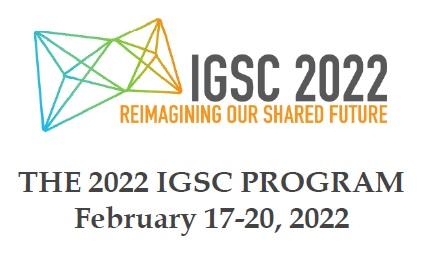
Keynote Address, February 17, 4:30-6pm HST
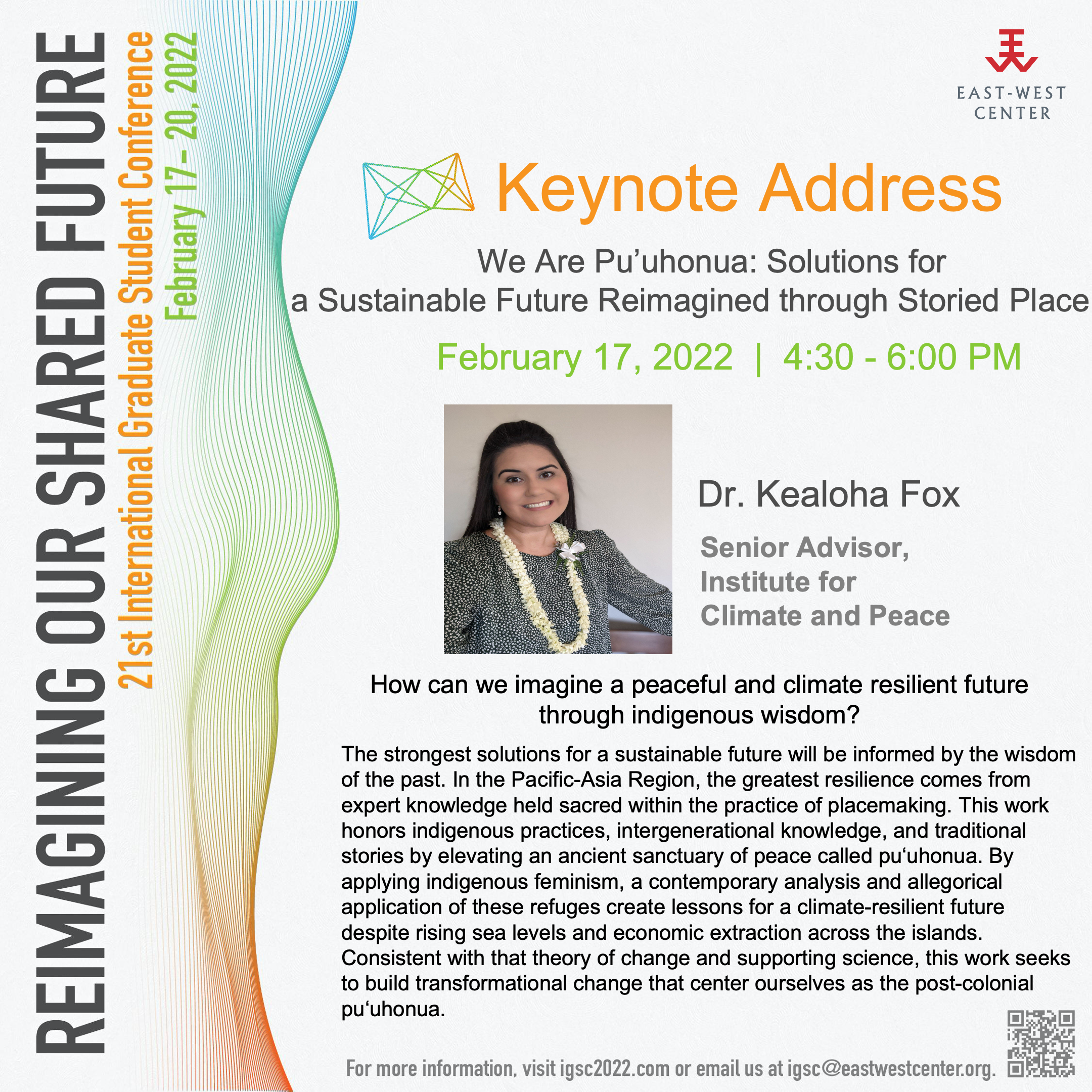
Closing Ceremony, February 20, 3:30-5:00pm HST
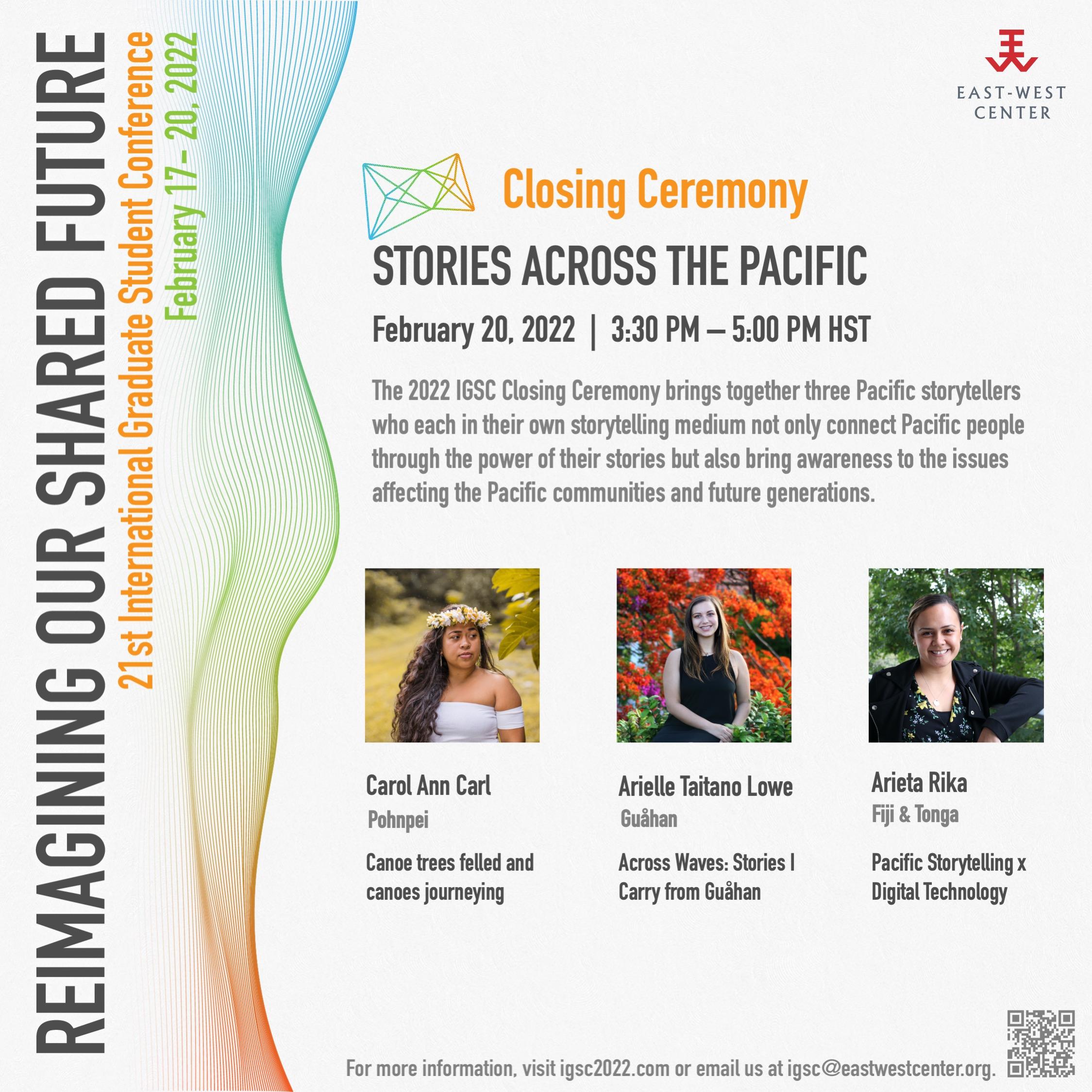
Theme: Reimagining our Shared Future
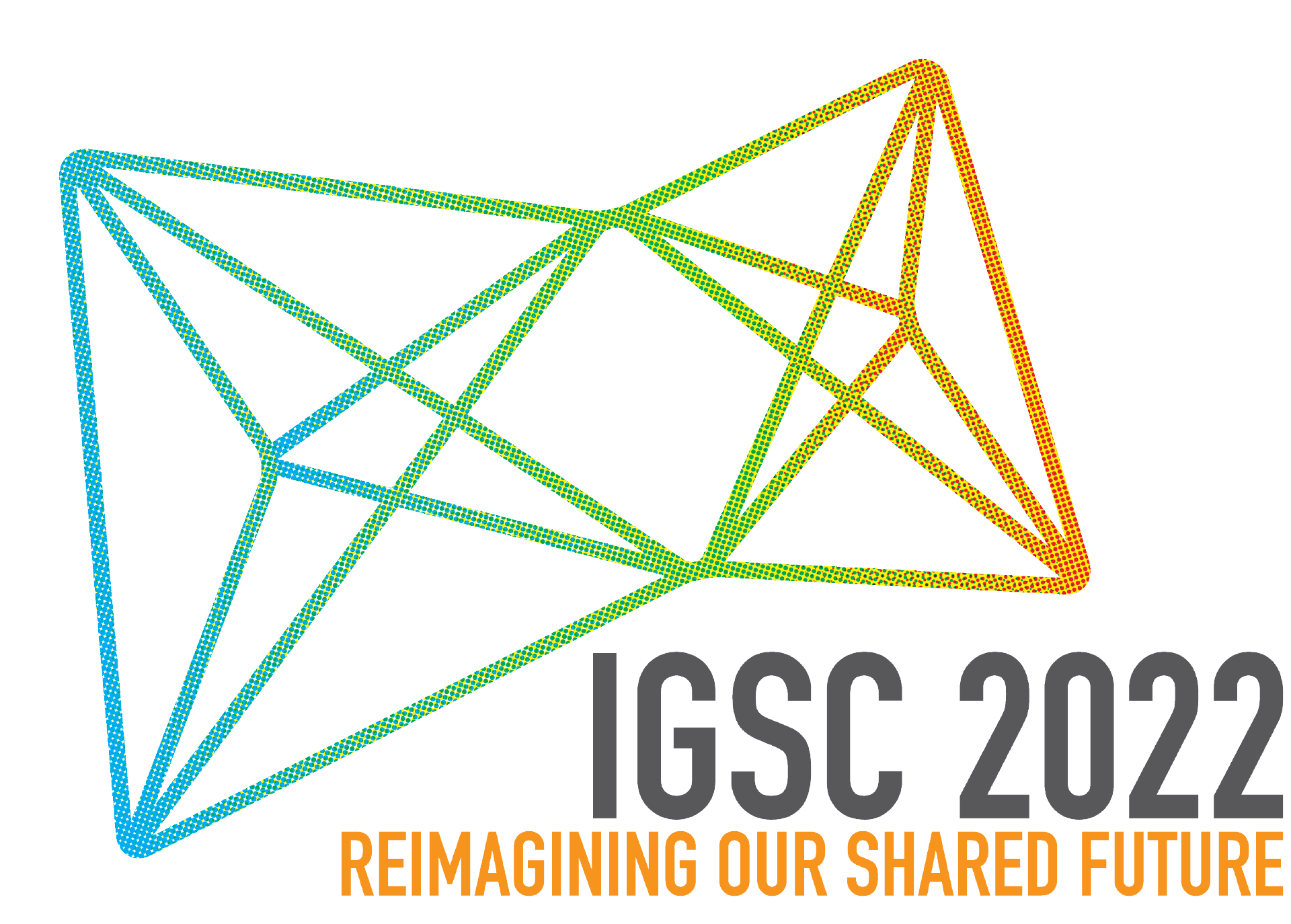
Logistical Information (FAQs)
Conference Venue and Accommodation
- Single room dorm - $19/night
- Double dorm room - $29/night
- Studio room - $41/night
- Corner Studio room - $54/night
- 1 bedroom w/kitchen room - $65/nightU.S. Visa Information
- for embassy location, policies, and procedures for visa applications/issuance
- for wait times for required visa appointments/issuance by consular post
- for countries participating in a visa waiver program with the United StatesPast Conferences
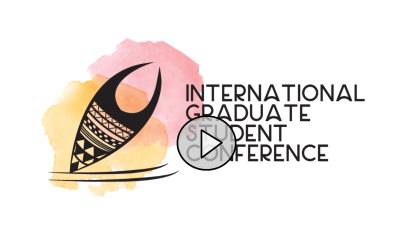
c/o EWC Education Program
1601 East-West Road, Burns Hall 2089
Honolulu, Hawai‘i 96848
USA
Ph. (808) 944-7458
Fax (808) 944-7070
Email: [email protected] Travel notice:
The 21st East-West Center International Graduate Student Conference
Virtual Conference Dates: February 17-20, 2022

Keynote Address, February 17, 4:30-6pm HST

Closing Ceremony, February 20, 3:30-5:00pm HST

Theme: Reimagining our Shared Future

Logistical Information (FAQs)
Conference Venue and Accommodation
- Single room dorm - $19/night
- Double dorm room - $29/night
- Studio room - $41/night
- Corner Studio room - $54/night
- 1 bedroom w/kitchen room - $65/nightU.S. Visa Information
- for embassy location, policies, and procedures for visa applications/issuance
- for wait times for required visa appointments/issuance by consular post
- for countries participating in a visa waiver program with the United StatesPast Conferences

c/o EWC Education Program
1601 East-West Road, Burns Hall 2089
Honolulu, Hawai‘i 96848
USA
Ph. (808) 944-7458
Fax (808) 944-7070
Email: [email protected] Travel notice:

